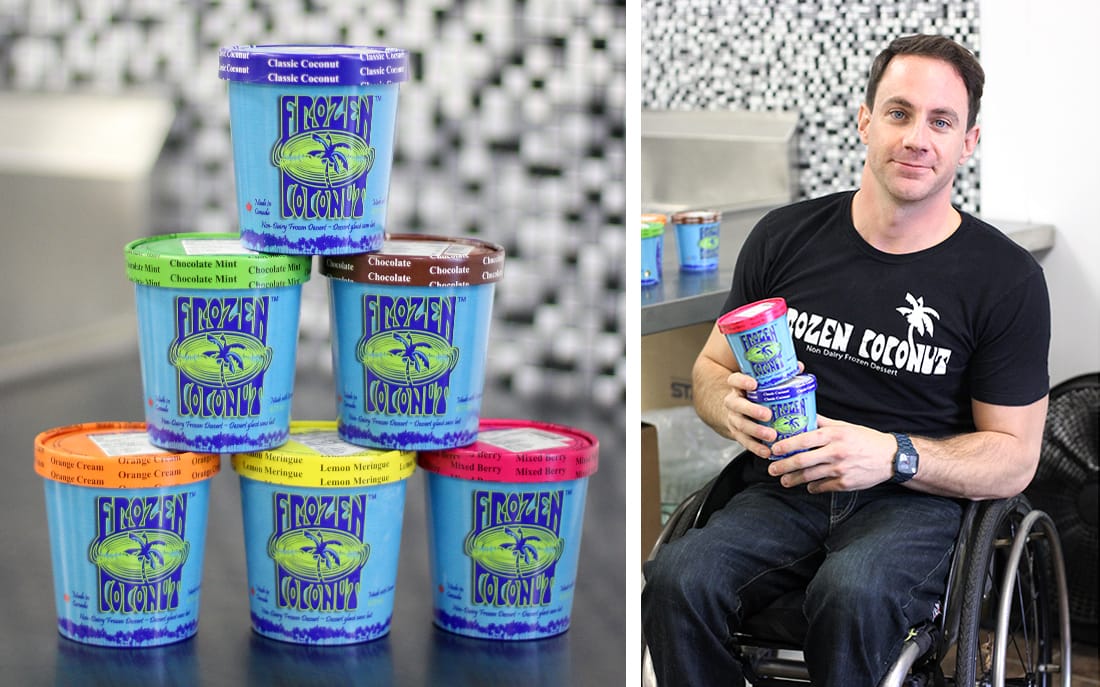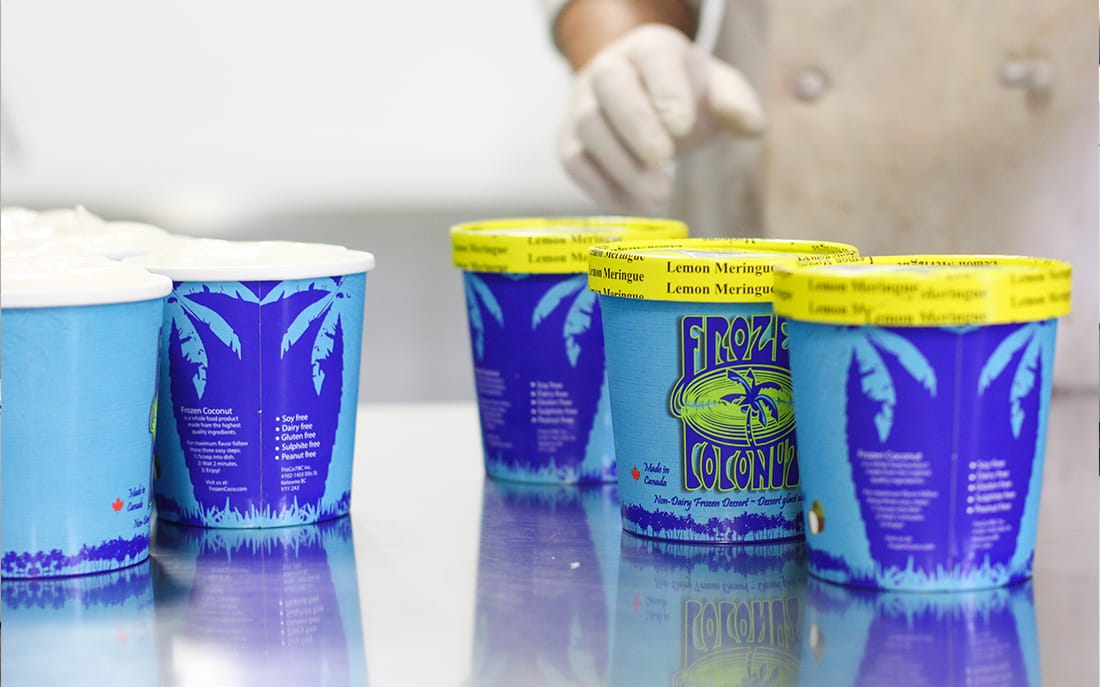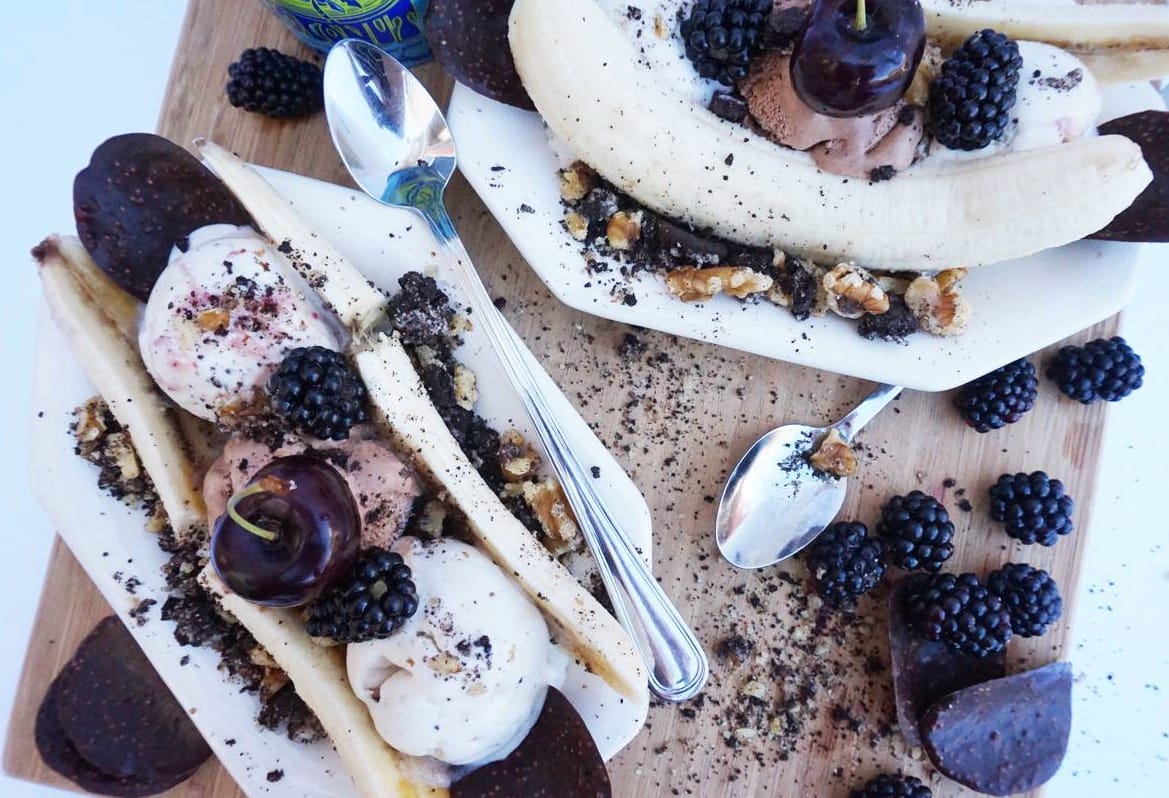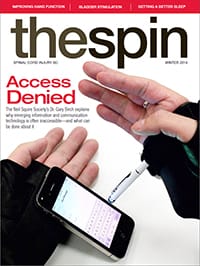
Kevin Carta abandoned a blossoming career in ballet. His garage-band music label folded before it ever really took off. And, if the single-car accident that left him a T10 complete paraplegic at age 20 wasn’t enough, less than a decade later he found himself in another collision—this one involving a second car and his own family of passengers, leaving him with severe post-traumatic stress.
By his 30th birthday, it seemed as though life had handed Kevin Carta a whole lot of lemons.
Fortunately, life also granted Carta a zest for entrepreneurial adventure along with a like-minded friend, Ryan Geni, who had recently been laid off.
On account of his pregnant wife’s lactose intolerance and his own vegan preferences, Geni had learned to make a mean homemade coconut ice cream. When Carta hosted a small birthday soiree at his Kelowna house, Geni brought over a bucket of the creamy, dairy-free dessert. It was a hit, and Frozen Coconut was born.
“I’d always been kind of a big dreamer,” says Carta. “But I think that after my accident, I needed something that was a little more adventurous than the typical office job to draw me out.”
The duo began selling the organic, lactose-free coconut concoction at the Kelowna Farmer’s Market, first in single-serve cups, then in plain one-litre tubs. But after two successful summers, and with coconut still on trend as a “superfood” and customers asking about home delivery options during the farmer’s market’s off-season, the pair realized they’d reached a tipping point—they needed to go big, or go home.
They got their product into a few supermarkets—but they realized that before they could knock on doors in earnest, they’d need some real credentials. And Geni had a plan.
“At first I laughed,” says Carta. “I said, ‘Ice Cream University? Is that right next to Clown College?’”
But Geni was serious. Located in New Jersey, Malcolm Stogo’s Ice Cream University gives its students the opportunity to study with frozen dessert enthusiasts from around the world in a classroom-kitchen setting. Geni and Carta signed on, and over five intensive days, they honed techniques in non-dairy ice cream production and strengthened their existing product under the guidance of the university’s namesake president and professor—a repeat author, inventor of the chocolate-dipped waffle cone, and a veritable celebrity in the world of frozen delights.
Despite a few setbacks near the end—the duo just narrowly avoided getting stranded by Hurricane Sandy—the trip was a delicious scholarly success. Armed with new confidence and knowledge, Carta and Geni arrived home and quickly transitioned their lovely bunch of coconut ice creams into a budding business.

Success came in a flurry. Frozen Coconut swapped out its faceless white container for a blue and neon splash of the tropics, with different coloured lids to match its six island-inspired flavours: Classic Coconut, Chocolate Mint, Mixed Berry, Orange Cream, Lemon Meringue and Chocolate. “We designed it as more of a refreshing treat,” says Carta. “It’s not super decadent, so we purposely avoided doing stuff like caramels, peanut butter, chocolate chunk, that kind of thing.”
Retailers embraced their creation. Today, the tropical tubs of melt-in-your-mouth goodness are sold in over 100 stores across Western Canada, including Urban Fare, Cooper’s Foods, Save-On-Foods, and Dad’s Organic Market.
Carta, now 33, recently moved from Kelowna to Vancouver to be near his vendor base and the company’s Richmond manufacturing facility, which is where we caught up with him.
The well-lit, simply-stocked and modestly-sized room is a far cry from the kind of manufacturing plant you associate with modern-day food labels. And, like its facility, Frozen Coconut’s production process is refreshingly minimalist.

Raw, fair trade coconut milk, sourced from Thailand, allows for a taste and texture that’s creamy, not oily. The balanced sweetness comes from agave syrup, and a touch of sea salt rounds out the flavours. Frozen Coconut contains no dyes or additives. And because it’s organic, lactose-free and nut-free, it’s truly a product that everyone can enjoy—a completely inclusive dessert, if you will.
“A lot of it stems from my own situation,” says Carta. “Nobody likes to feel like they’re not included in something. Nobody likes to go to places that they can’t get into, so we try to have that in our business model as well. We try to include everyone.”
That same inclusiveness extends to the brand’s business model: always say yes; add value, not competition. However, Frozen Coconut draws the line when it comes to trade secrets—recently, the company’s new brand manager not-so-gently advised Carta to keep details of six new tropical flavours, set to launch in the Spring of 2015, a corporate secret.
"Frozen Coconut—that's what's really gotten me back into being an active member of society—I'm going to push it as far as I can, and it's going to pull me the rest of the way."
These days, Carta is experiencing sweet success, but it’s never far from his mind that life before Frozen Coconut was a rocky road. True, his post-injury stays at both the Vancouver General Hospital and GF Strong Rehabilitation Centre had been fortuitously brief (in high school, Carta had broken both of his legs snowboarding and was somewhat accustomed to maneuvering a wheelchair). but a couple of years after his injury, Carta fell into a pattern of depression, anxiety, and isolation. It took several more years for him to get back to a place of confidence and focus. And just when he did, he was thrown into a second car collision.
“This business has actually been kind of like a mask for me in a lot of ways—like a shield,” he admits. “Because I got it in my head that I was cursed after that accident—you know, I don’t need to be told more than a few times that something’s wrong or that I should just stop trying.”
For two years, he stayed in his house with a girlfriend who was happy to do the same.
And then, a pact from the past caught up to him. Nearly a decade earlier, Carta and a friend from rehab had made a deal that, when they were ready and medicine had advanced enough, they would travel abroad for experimental surgery. Now Carta’s friend was eager to go (though it was questionable whether or not medicine had truly advanced).
Alone, he would never have elected the surgery or a trip to India, but Carta isn’t a man who backs out of a deal. So he and his friend travelled to New Delhi. And although the success of the epidural surgery was limited, the trip itself helped Carta address his anxiety and withdrawal.
“Honestly, if it wasn’t for me going to India, I wouldn’t be this far in the business right now,” he says. “Just being in a place like that with so many people, so much chaos, and nothing bad happening. There are a million people honking and driving around and they’re not constantly bumping into each other. I saw that you can go out into the world and not have bad things happen.”
With the weight of his curse lifted, Carta returned to Canada and narrowed his focus: from small business to health food to coconut ice cream. And the rest is history.
“Nobody likes to feel like they’re not included in something. Nobody likes to go to places that they can’t get into . . . We try to include everyone.”
He concedes that entrepreneurship can be demanding. “It’s not just physical challenges, but the emotional aspect of it. You have to put on a nice shirt, comb your hair, shave, go out and be the face of the product. And sometimes you really do have to dig deep for that.”
As for his SCI, he admits that it does impose limitations. Loading ice cream pallets and vending carts will always be a job more easily done by Geni. And hours of driving between Kelowna and Vancouver, and popping in on vendors, does get exhausting. But he also recognizes that having an SCI sometimes gives him a leg up on his competitors. “For anything that’s more challenging, there are also certain doors that open because of it,” says Carta. “A lot of people are very quick to make the connection, ‘Oh, this guy’s very serious about what he’s doing or else he wouldn’t be here.’ They can see that, just for me to get there, it took a little more effort. It’s been a very interesting kind of social experiment.”

It helps that Carta believes strongly in putting out a clean, socially responsible product—particularly when you compare it to what he describes as the “dirty business” of mainstream ice cream. “It’s a product for kids,” he says, “with a lot of ingredients you can’t name, food colourings, processing techniques and just absurdities that nobody would really, when they sat down and thought about it, give to a developing child.”
Currently, Frozen Coconut has a handful of competitors in North America. But with sales tripling between this past April and June, more than 100 stores already carrying the product in Canada, and a lofty but realistic goal of adding another 500 vendors by next summer, Frozen Coconut’s momentum won’t be thawing any time soon.
“Frozen Coconut—that’s what’s really gotten me back into being an active member of society,” says Carta. “I’m going to push it as far as I can, and it’s going to pull me the rest of the way. So for me to keep going and to keep challenging myself, the business needs to keep growing. If the business were to suddenly slow down or if we were to be content, then it just wouldn’t work for me because then the adventure would stop.”
It’s been said that when life gives you lemons, make lemonade. It’s only fitting then that one of Frozen Coconut’s most popular flavours is Lemon Meringue.
To locate Frozen Coconut vendors, get more info, or connect with Kevin, visit frozencoco.ca.

This article first appeared in our Winter 2014 issue of The Spin, alongside other stories including:
- Improving Hand Function
- The Problems with Inaccessible Information and Communication Technology
- Getting a Better Sleep
- Bladder Stimulation
- Phoenix Attitude: A Tool for Navigating the Medical System
- And more!



